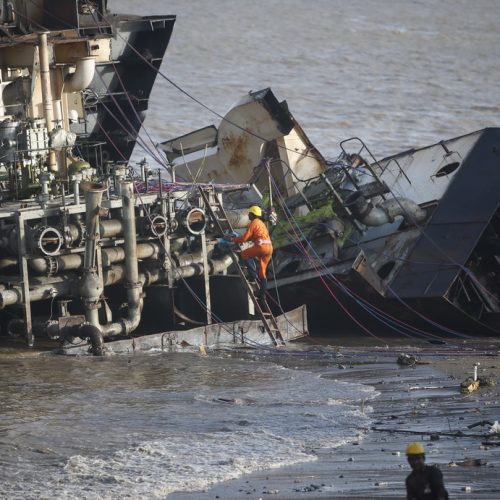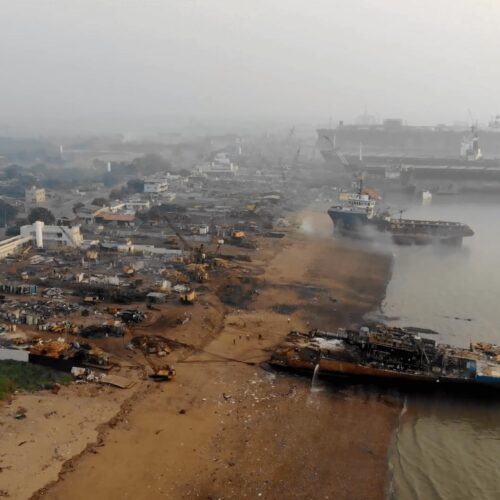Press Release – Another worker dies at Alang shipbreaking yard
A wake-up call as Hong Kong Convention’s entry-into-force will rubberstamp dangerous practices
Just weeks before the Hong Kong Convention (HKC) for the Safe and Environmentally Sound Recycling of Ships is set to enter into force on 26 June, another shipbreaking worker died in Alang—the world’s largest ship dismantling site—at a facility that claims to already be compliant with the Convention’s standards [1].
On 20 May, 20-year-old Satur Bhai, from Bhara Para village in Gujarat’s Bhavnagar District, fell to his death while dismantling the vessel REM (IMO 9157739) at Plot No. 50. Without a safety harness, he was tasked with removing furniture from the ship’s seventh level. He was employed as a begari (helper)—a position typically untrained, underpaid, and unprotected.
The REM, formerly sailing under the South Korean flag as SK SUPREME, was reflagged to St. Kitts and Nevis before being dumped in Alang. This deliberate flag-switching is a textbook case of regulatory evasion, allowing the vessel’s beneficial owner—South Korea’s SK Shipping Co. Ltd—to sidestep international safety and environmental norms, and to obtain the highest profit for the end-of-life asset.
Despite growing scrutiny, dangerous and abusive practices remain the norm in Alang where ships are scrapped on tidal mudflats. And while the HKC aims to regulate the industry, its weak provisions threaten to legitimise these very conditions.
Satur Bhai’s death is not isolated. In these last five years at least 10 workers have lost their lives taking apart the global fleet in Alang under conditions that would never be allowed in major ship owning countries, including South Korea. With 90 percent of the global fleet still being scrapped on three beaches in South Asia, the shipbreaking sector is marked by systemic neglect, opaque ownership structures, and a race to the bottom in environmental and labour protections.
This latest fatality follows renewed calls on South Korea to end the dumping of end-of-life vessels on South Asian shores. The export of hazardous waste—including ships laden with toxic paints, asbestos, and residue oils—to countries without proper containment and disposal infrastructure contravenes the Basel Convention on the Control of the Transboundary Movements of Hazardous Waste and their Disposal, to which South Korea is a party.

NOTE
[1] In the last years, there has been a proliferation of the so-called Statements of Compliance with the Hong Kong Convention, inspections conducted at yards on a business-to-business basis as yet another attempt by the industry to greenwash its dirty and dangerous practices. Facilities that lack infrastructure to contain pollution; lack protective equipment to prevent toxic exposure; have no hospitals to handle emergencies in the vicinity; and where systemic breaches of labour rights have been documented have been able to obtain these Statements.
Related news

Press Release – Major explosion at Bangladesh shipbreaking yard kills two workers and severely injures five
A fire broke out on board the Malaysian-owned vessel BUNGA KELANA 4, beached at Mahinur Ship Breaking yard.
... Read More
Platform publishes South Asia Quarterly Update #19
There were a total of 193 ships broken in the second quarter of 2019. Of these, 146 ships were sold to the infamous scrapping beaches of South… Read More

Platform News – Maersk maintains beaching mantra and chooses to ignore facts revealed by Danwatch
After investigative journalists have revealed the severe short-comings of Maersk’s shipbreaking practices in Alang, India, the shipping giant blatantly disregards the findings. In an official statement, Maersk… Read More

Press Release – Record-breaking number of fatalities on the beach of Chattogram
At least seven workers lost their lives while scrapping vessels on the beach of Chattogram in what is the worst quarter in terms of number of accidents… Read More

Press Release – Turning point: new tech and developments for a new future of ship recycling presented at the Lab
Stakeholders that are pioneering a new future for sustainable ship recycling gathered in Rotterdam at the NGO Shipbreaking Platform’s Ship Recycling Lab.
... Read More
Press Release – Norwegian Altera Infrastructure avoids trial by accepting fine for illegal shipbreaking
The NGO Shipbreaking Platform welcomes the NOK 8 million fine imposed on Norwegian ship management company Altera Infrastructure for the illegal scrapping of the two shuttle tankers NAVION BRITANNIA… Read More


